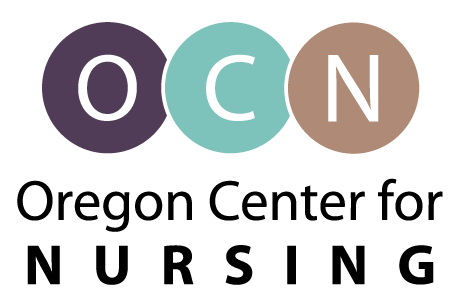The year 2020 was supposed to be about a lot of things – the start of a new decade, the Year of the Nurse and Nurse Midwife, Summer Olympics, a presidential election. Only three months into the year, the COVID-19 pandemic drastically changed the world we live in. As healthcare professionals and policymakers work with the public to flatten the curve, communities, organizations, and experts are uncovering system flaws, designing new approaches, testing long-held assumptions and navigating healthcare in new and changing ways.
The Oregon Center for Nursing (OCN) continues to connect with policy makers across the state and healthcare providers in a variety of care settings during the pandemic. As we continue to monitor the spread of COVID-19 and the state’s response, we’ve identified several powerful concepts:
Power of Data
“Without data, you are just
another person with an opinion.”
-W. Edwards Deming
In the case of COVID-19, emergency planners immediately needed reliable data on the supply of healthcare professionals at a regional, community and organization level. How many healthcare providers do we have? How many will we need? What skills will they need? How do we find more?
The COVID-19 pandemic shined a spotlight on the ways workforce data can be used to understand and mobilize a profession. It has also reinforced the disparity in data availability across professions. While information on the pipeline and supply of nursing professionals in Oregon is readily available, information on other health professions can be harder to locate. As the COVID-19 pandemic crisis peaks, organizations should continue to consider how internal and external data can continue to shape their workforce planning.
Power of Connection
“Networking is not about just connecting people.
It’s about connecting people with people,
people with ideas, and people with opportunities.”
-Michele Jennae
Information is a critical commodity in these rapidly changing times. From the beginning of the pandemic, OCN recognized nursing leaders and stakeholders needed a way to share information and strategies to navigate the COVID-19 pandemic. Our weekly Friday Huddles became a way to gather leaders, identify issues and share emerging solutions across regions and systems.
Organizations across the state and nation are collaborating and sharing best practices at lightning speed as they respond to the pandemic. As we contemplate life A.C. (anno Coronavirus), hopefully connections reinforced during this crisis will continue so the nursing community can work on strategies to address transition-to-practice, nurse retention and other issues facing the profession.
Power of Disruption
“Never be afraid to fall apart because
it is an opportunity to rebuild yourself
the way you wish had been all along.”
-Rae Smith
The COVID-19 pandemic has created unique challenges for the nursing pipeline and workforce. The cancellation of in-person classes and clinical placements for nursing students has programs across the state exploring new education delivery models. Healthcare organizations are finding ways to mobilize staff to meet the needs of COVID-19 patients, while simultaneously furloughing workers as cancelled elective surgeries and low census numbers affect staffing needs.
While these situations have created stress and hardship, the disruption has also provided a unique opportunity to look at ways to transform both nursing education and workforce staffing. Hospitals are testing out new models of care to involve more nurse practitioners. Education programs are expanding their use of simulation and virtual learning technologies. Organizations are modifying and expanding residency programs to cross-train and transition nurses to work in new areas. Some of the tools and transformations used to navigate the COVID-19 pandemic may find a permanent place in the nursing workforce.
“When you come out of the storm
you won’t be the same person who walked in.
That’s what this storm’s all about.”
-Haruki Murakami
When the COVID-19 crisis subsides in Oregon, many will be tempted to get back to business as usual. We hope to continue building off the many macro- and micro-lessons and improve nursing education, workforce planning, and collaboration. As one of our “nursing gurus” wisely asked:
Given all that we are learning during the pandemic,
what are the opportunities for transformation, innovation,
change, and growth, that we don’t want to miss?
How do we capitalize on this moment to create a better future?
Nursing is a powerful profession bearing witness to history. In this International Year of the Nurse and Nurse Midwife, may we embrace the power of the pandemic and recognize the opportunities it creates for nursing and healthcare transformation.
About the Oregon Center for Nursing:
OCN is a nonprofit organization created by nursing leaders in 2002. OCN facilitates research and collaboration for Oregon’s nursing workforce to support informed, well-prepared, diverse and exceptional nursing professionals. Recognized by the Oregon state legislature as a state advisor for nursing workforce issues, OCN fulfills its mission through nurse workforce research, building partnerships, and promoting nursing and healthcare.
